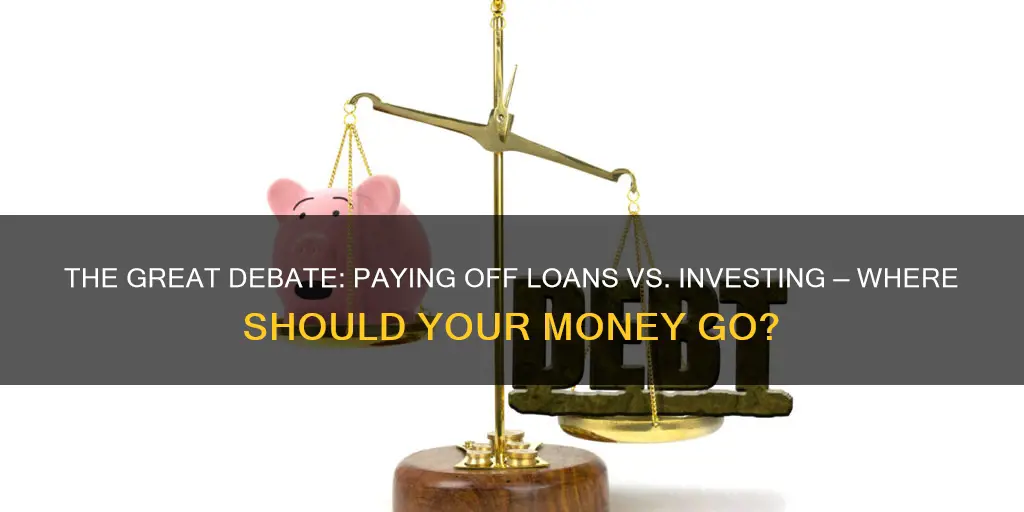
Whether to pay off a loan or invest depends on a person's financial situation and goals. People with high-interest credit card debt may want to focus on clearing that first, as it can be challenging to invest while paying interest on debt. However, investing can be a good option if you can earn more on your investments than your debts are costing you in interest.
| Characteristics | Values |
|---|---|
| Interest rate on debt | If the interest rate on your debt is 6% or greater, it is generally better to pay off the debt before investing. |
| Interest rate on investments | If you can earn more interest on your investments than your debts are costing you in interest, it makes sense to invest. |
| Credit score | Paying off debt can improve your credit score, which is important if you want to buy a home or finance a vehicle. |
| Risk tolerance | If you are comfortable taking the risk that your investments will fluctuate with the market, you may be more suited to investing than someone who would worry about market fluctuations. |
| Retirement timeline | It is generally best to avoid bringing debt into retirement, so consider how close you are to retirement when deciding whether to pay off debt or invest. |
| Emergency fund | It is recommended to have an emergency fund in place before deciding whether to pay off debt or invest. |
| Tax benefits | Student loan interest and mortgage loan interest are tax-deductible, so investing ahead of paying off these types of debt can be beneficial. |
What You'll Learn

The pros of paying off debt first
Paying off debt first can be a great feeling, and it comes with several benefits. Here are some pros of paying off your debt before investing:
- Improved cash flow and financial freedom: Eliminating debt means eliminating monthly payments, which results in more cash on hand each month. This extra money can be put towards savings, investments, or other financial goals, improving your overall quality of life.
- Stress relief: The more debt you have, the more stressful your financial situation can be. Paying off debt alleviates the stress associated with owing money and brings you closer to financial peace.
- No more interest payments: Once your debt is paid off, you no longer have to worry about paying interest. This means you'll be putting money towards something that directly benefits you, instead of towards interest payments.
- Better secure your future: By paying off debt, you'll be in a better financial position. The money that would have gone towards debt payments can now be put into an emergency fund, retirement account, or other investments to secure your financial future.
- Improved credit score: Depending on the type of debt, paying it off can positively impact your credit score. For example, eliminating credit card debt will likely improve your credit score, as it reduces your credit utilization ratio, which is a significant factor in calculating your score.
- Avoid legal issues: Prioritizing tax debt and debt in collections can help you avoid potential legal consequences.
While there may be some drawbacks, such as a temporary cash flow problem or a negative impact on your credit score in certain cases, the pros of paying off debt first can provide significant financial and mental benefits, giving you the freedom to pursue other financial goals.
Retirement Planning: Your Investment Mix
You may want to see also

The benefits of investing early
Investing early on in life is beneficial for several reasons. Here are some advantages of investing early:
Compound Interest
Compound interest, often referred to as the "eighth wonder of the world", is the interest earned on interest. By continuously reinvesting your earnings, you exponentially increase your return on investment. The earlier you start, the more time your money has to grow. For example, a single $10,000 investment at age 20 would grow to over $70,000 by the time the investor was 60 years old (based on a 5% interest rate). The same investment made at age 30 would yield about $43,000 by age 60, and only $26,000 if made at age 40.
Higher Risk Tolerance
The more time you have, the more financial risk you can take on. Younger investors have more time to ride out financial storms and recessions, and recover from any losses. As a result, they can afford to take on more risk in their investment activities and build more aggressive portfolios that are subject to more volatility but also stand to produce larger gains.
Experience and Knowledge
Investing early on gives you more time to learn about investing and gain valuable experience. Investing has a lengthy learning curve, and the earlier you start, the more time you have to study the markets, refine your investing strategies, and learn from your successes and failures. This experience will help you make better investment decisions and avoid common pitfalls.
Improved Financial Habits
Starting to invest early encourages the formation of good financial habits. It instils discipline and encourages a focus on budgeting and cutting expenses. It also helps individuals avoid debt and spend less than they earn, which leaves more money available for investing and saving.
Improved Quality of Life
Investing early can lead to an improved quality of life, both now and in the future. It can reduce financial stress, improve financial security, and increase the likelihood of achieving financial goals, such as buying a home or retiring early. Additionally, investing early can provide a safety net in the event of unexpected expenses or financial hardships.
Invest Now: Where to Put Your Money
You may want to see also

When to invest before paying off debt
Crunch the numbers
To decide between paying off debt and investing, you need to compare your expected investing return with the interest you are paying on your debt. You also need to consider taxes, as some types of interest, like student loans or mortgages, may offer tax incentives depending on your income.
Weigh up the risk
If you can earn more interest on your money by investing it than your debts are costing you, then it makes sense to invest. However, investments can be volatile, so you need to consider your risk tolerance. If you are comfortable with the gamble that your investments will fluctuate with the markets, then investing may be a good option.
Consider your credit score
Paying off debt, especially credit card debt, can improve your credit score. This can be important if you want to borrow money in the future, such as for a mortgage or car loan. It can also affect insurance premiums, renting an apartment, and even employment prospects.
Don't neglect your retirement plan
Before deciding on a debt payoff or investing strategy, review your company's retirement plan. Many companies offer to match a percentage of your contributions, which is essentially free money. You don't want to miss out on this perk while focusing on other financial goals.
Establish an emergency fund
Before investing or paying off debt, it's a good idea to have an emergency fund to cover unexpected expenses. This will help you avoid racking up more debt in the future. Aim for a long-term goal of three to six months' worth of expenses.
Find a balance
You don't necessarily have to choose between investing and paying off debt – you can do both. Prioritise creating an emergency fund and contributing enough to your retirement plan to get any employer matches. Then, focus on paying off high-interest debt while also investing for the future.
Alibaba Stock: Buy or Bye?
You may want to see also

How to do both: invest and pay down debt
For many people, it is entirely possible to do both—invest and pay down debt. Here are some steps to help you achieve a balance between investing and eliminating debt:
- Establish an emergency fund: It is recommended to have an emergency fund with enough money to cover your bills for at least three to six months. This will help you avoid racking up more debt in case of unexpected expenses.
- Consider debt relief options: Establish a debt management plan to help lower your debt. A debt management counsellor can negotiate with creditors on your behalf to reduce monthly payments and interest charges. The money saved can then be put towards investing.
- Find a side hustle: Increasing your income can help you eliminate debt faster and generate cash to invest. Consider finding a side job that fits easily into your routine.
- Prioritise high-interest debt: If you have multiple debts, focus on paying off those with the highest interest rates first, such as credit card debt. This will save you money in the long run.
- Don't skip your company's retirement plan matches: Many companies offer to match a percentage of your retirement contributions. This is essentially free money, so be sure to take advantage of it while working towards your financial goals.
Act Now: Why Waiting to Invest is Costing You
You may want to see also

Tips for managing debt and investing
- Talk to a financial advisor: They can help you decide on the best investment strategy for you based on your age, risk tolerance, and goals.
- Have a detailed budget: Outline your income and expenses, and dedicate every dollar you make to a specific goal, such as paying bills, saving, or paying off debt.
- Set clear goals: Make sure your goals have a clear, defined number and give yourself a deadline for reaching them.
- Find "extra" money: Go over your budget to find extra money that could be used for saving or investing. For example, cut out subscriptions or cancel an unused gym membership.
- Refinance loans: If you have student loans or a mortgage, consider refinancing to lock in a lower interest rate. This could reduce your monthly payments and free up money for investing.
- Take advantage of employer matches: If your employer offers a 401(k) or similar plan, contribute enough each year to get the full employer match. This is essentially "free money" and can help your investments grow faster.
- Compare investment options: Take time to compare different investment options, such as online brokerage accounts, to see the range of investment choices and the fees they charge.
- Start with high-interest debt: If you're deciding between paying off debt or investing, focus on paying off debt with high interest rates first, such as credit card debt. This will save you more money in the long run.
- Establish an emergency fund: Before investing, make sure you have at least a small emergency fund to cover unexpected expenses. This will help you avoid taking on more debt in the future.
- Consider debt relief options: If you're struggling to make payments, consider a debt relief company or a debt consolidation loan to help lower your monthly payments and interest charges.
- Increase your income: Consider finding a side hustle or another source of income to help you pay off debt and generate cash to invest.
Invest or Repay: The Great Credit Conundrum
You may want to see also
Frequently asked questions
There are several reasons to consider paying off debt before investing. The sooner you eliminate debt, the less interest you will have to pay. With no debt payments, you may have more money in your budget to save and invest. Reducing debt can also improve your credit score, which is important if you want to buy a home or finance a vehicle.
There are benefits to investing early and often. One important reason is compounding interest, which is the interest earned on your interest. The younger you are when you start investing, the more time works in your favour. Another reason to consider investing ahead of paying off debt is the tax benefit associated with carrying certain debts, such as student loan interest and mortgage loan interest, which are tax-deductible.
Paying off high-interest debt is likely to provide a better return on your money than almost any investment. However, if you have a loan or credit card with a low-interest rate, you may be better off investing your money instead, as it could earn more money faster than interest accumulates on the debt.
It is generally recommended to pay off any debt with an interest rate of 6% or greater first. This is because there is a greater chance that your long-term investing returns will be better if your debt has a lower interest rate. However, this guideline assumes that you already have emergency savings, have captured any employer match on retirement savings, and have paid off any credit card debt.
Yes, it is possible to do both if you have a plan. This begins with creating a detailed budget that outlines your income and expenses, and setting clear financial goals.







